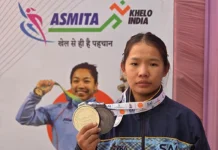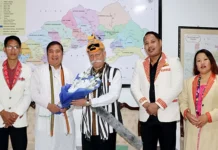TribalBookworms
[Dr Bompi Riba]
Amidst animated discussions and endless refills of green tea with Dr A derides, accompanied by an old Galo song sung by Moge Doji, where a girl is likened to the flower of tagekgellww (Indian coral tree), which is deemed worthless due to its lack of fragrance, it seems that its insignificance is heightened by the fact that it grows high up in the trees, making it difficult to pluck.
With an average height of 50 to 65 feet, they can grow up to 82 feet under favourable conditions. In the Galo society, tagekgellww is considered unsuitable for offerings in sacred places such as Donyi-Polo Gamgw. It is not even considered worthy of being woven into garlands for presentation to elders and dignitaries in public events.
So, upon hearing that a woman was compared to this flower, I instinctively muttered under my breath, “misogynistic” – without even fully grasping the context of the song.
While our discussion trailed through various corridors of socio-cultural landscapes, it turned to Yabin Zirdo’s poem, tagekgellwwgvsii-ximar or The Woes of Tagek Gellww. In the poem, the poetess reclaims its symbolism and embodies it herself while highlighting the prohibitions associated with the flower. She challenges the rhetoric established against it. She argues that just because it blooms high up in the tree and is not easily accessible, it is wrong to call it an ill-fated flower. In doing so, it resonates with the famous saying, ‘Grapes are sour’ from the popular fable ‘The Fox and the Grapes’.
Furthermore, she claims that she does not see it as insignificant due to its lack of fragrance. While onlookers may view it as a major flaw but not her. She believes that god created it this way and it is what makes it unique. Despite lacking in fragrance, its striking red colour attracts birds and bees and they come to it for nectar and leave satisfied. She also states that when it blooms, it is a signal for the farmers to cultivate crops. Its blooming also announces the arrival of Mopin, the agriculture festival. Its worth is clear to her, even if it is unrecognized by others.
The poem clearly gives a message that every woman, regardless of her profession or role, holds a unique and irreplaceable value. Whether she is a homemaker, a teacher, an athlete, a politician, or a bureaucrat, each woman brings something invaluable to the world. Though their contributions may not always be immediately visible, their impact is profound. Women are not only mothers, daughters, sisters and wives; they are also providers, fighters, survivors and the strongest pillars not just for their homes but the nation too. Each one of them displays incredible resilience and power in their own way. Just as the flower, though scentless, attracts life through its vibrant beauty, women, in all their diverse roles, enrich the world with their strength, determination, and nurturing spirit. Every woman is, in her own right, remarkable and worthy of admiration.
This discussion led to more evenings of green tea and enthusiastic translation of Yabin Dabi Zirdo’s collection of Galo poems, ‘Muugo-`Roli (Melody of Thoughts)’, but it wasn’t without its many challenges, despite the momentary delight too. Honestly speaking, ‘translation’ is an ordeal, and particularly so for a person like me, who belongs to that generation who can hardly speak his/her mother tongue fluently. I wouldn’t particularly blame ourselves or our parents. It was the time when televisions and DTH were aggressively intruding the living space of the government quarters of our parents, who were first-generation learners in their respective families. DTH services gave them the scope to see the world beyond their immediate surroundings. They saw the importance of education and also must have foreseen the lucrative prospects of English and Hindi languages. Most of us were sent to hostels, as early as four years old, where speaking in mother-tongue brought consequences. A thwack on the buttock with a wooden bat or sharp strikes on our palms with a cane stick were good enough reasons for young minds to give up speaking in their mother tongue and speak in broken English. However, everything we consumed on TV during weekends was in the Hindi language. We also witnessed the gradual shift of language in the bazaar from Assamese language, the language in which our parents were taught in school, to Hindi language. The predominance of both English and Hindi languages led the mother tongue to hit the skids. Ironically, most of us are not yet fluent in either of them and the latter has in fact transmogrified into a nonchalant and nativized Arunachali Hindi.
You may blame the circumstances or your parents or maybe the society may blame you, but you cannot deny that without your language, you are incomplete. It really is a hurdle to master one’s mother tongue as an adult. You can’t do so unless you persevere and love the language. You can begin by learning to sing your local songs or you can pick up literature in that language. Unfortunately, the prospects for the second option are grim as is the case with most oral societies. Nevertheless, the Galo society has developed the ‘Galoo Ennam’, which uses modified Roman script and has allowed writers like Dr Takop Zirdo and Yabin Dabi Zirdo to become pioneers in Galo literature. In the preface of her book, Muugo-`Roli, the poetess mention that she was greatly inspired by the aesthetic value of the traditional art form of ‘Kaaben Kabnam’ and ‘Nitom Ponu Mennam’, which are distinct forms of self-expression. To understand the characteristic of the former, I suggest that you listen to the deliberation made by Gumpi Nguso, Hindi Officer at Rajiv Gandhi University, in the session ‘Galo janjati ke katha nakke roop meinkaben’ telecast by Kanchenjanga Patrika Samuh on YouTube. According to her, Kaaben kabnam has pain ingrained in its core and yet it has positive value to it. This definition captures the very essence of the poem, ‘The Woes of Tagek Gellww’. The poet is empathetic towards the pain of the tagekgellww flower and ends the poem with a positive note as discussed above. However, it is to be noted that, while it is essentially cultural and is a farewell song sung primarily on occasions such as the sacrifice of the mithun, the bidding of farewell of the bride, the parting withfamily heirlooms, etc, Nitom Ponu Mennam is folklore/folksongs that essentially carries the beliefs and traditions of the Galo tribe.
Another poem that I really liked in this collection is ‘Aajirwyww’, in which the poetess is overwhelmed by the nostalgic recollection of her fondest memory of her childhood. She reminisces the special moments spent with her mother, who would display her love by hugging and kissing her, while tying the ornamented xopci, pronounced as nyopchi, around her hip. Xopci was basically a child-specific ornament tied around the hip for modesty. In the poem, it evokes the sense of the fleeting time that one can’t get hold of. Therefore, the poetess takes solace in finding comfort in the memory of the chimes made by the ornament, when it was being tied around her hip by her mother. Isn’t that a beautiful expression of longing and love? And what makes it unique is its rootedness in its culture. The poem also uses a poetic device called epistrophe, which means repetition of the same words or phrases in the successive lines. Structurally, it has an envelope structure, where the opening stanza and the closing stanza are the same and it gives a sense of closure to the poetess.
Also worth mentioning is the first poem in the collection, ie, ‘Qok Yumi V’ or ‘My Sleep’. The speaker of the poem can be the poetess herself or any fictional character. It is basically about a person who is having difficulty in falling asleep. He is unable to understand why he remains wide awake. As sleep eludes him, he wonders why rich people get richer and the poor poorer day by day. Even as he lays on the floor near the hearth as was the custom in traditional Galo houses, he keeps staring upward at the kaik and listens to the noisy mice running around as if moving in circles like the xikre or the rhythmic movement of a shaman.
This act of staring upward is called ‘roduu’ in Galo. Interestingly, this term ‘roduu’, which is a verb, also resonates with another term ‘roodu’, which is a noun, meaning, ‘anuyu or a spirit that punishes people for not following the instructions or taboos given by the shaman’. Perhaps, the lack of sleep is a punishment from roodu for not carrying out the restrictions as instructed by the shaman. Unlike the common adage that says that rich people lose their sleep over worries while the hardworking poor people fall asleep with ease, the speaker of the poem seems frustrated by the thought that rich people, who are rich during the day, become richer even so by night.
This poem has a dramatic element as it ends on an accepting note, when the speaker expresses gratitude to sleep for actually eluding him. He must have been really frustrated with insomnia that he finally gives in to the struggle and consoles himself by saying that at least he is not seeing nightmares and sad dreams. It is like saying in our colloquial Arunachali Hindi, “Thikhai, humko nind nahi aa rai, at least dhukhi aur kharab sapna toh nahi dekhega.”
Apart from insomnia being the major concern of this poem, it is to be noted that it also carries subtle humour, which can be experienced by the audience or the reader only if it is recited out loud. All of us have had our strengths drained out during difficult times but when we recount them, we tend to dismiss them with joke and everybody, including ourselves, laugh at our own expense. The concluding stanza evokes the same effect.
There are many such interesting poems in Yabin Dabi’s debut collection of Galo poems. In due course of time, some of them will be taken up again for the TribalBookworms. These poems do not only communicate the poetess’s emotions but also the deep cultural values, memory and worldview of her community. Her poems validate her personal as well as her community identity. They also ensure that the younger generation and also, the lost generation, like mine, to get connected with our roots by learning the language and not losing it to globalization. This initiative of hers also anticipates the prospect of enriching the history of Arunachal Pradesh through linguistic diversity. Hopefully, more literature in local languages will be published to reach and inspire readers. (Dr Bompi Riba is an Assistant Professor in the English department of RGU. She is also a member of the APLS and Din Din Club.)




